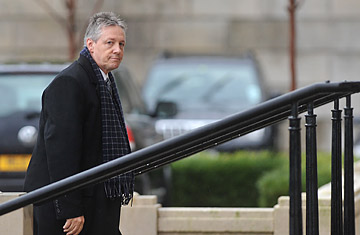
Northern Ireland's First Minister, Peter Robinson, arrives at Stormont in Belfast
The scandal has riveted Northern Ireland like few things before. First, Peter Robinson, leader of the province's Protestant-Catholic coalition government, admitted that his 60-year-old wife Iris had embarked on an affair with a teenager two years ago. Then came the allegations that she had obtained $80,000 from two property developers to help her lover set up a café and that Peter Robinson, upon learning of the deal, failed to report it. Now that the Evangelical base of Robinson's Democratic Unionist Party (DUP) has had time to digest the lurid headlines, the political fallout begins.
On Monday, Peter Robinson announced that he would step aside as First Minister for six weeks, saying he needed "time to deal with family matters" and vowing to clear his name. Iris Robinson, a prominent politician in her own right, gave up her seats in the British Parliament and Northern Ireland Assembly and checked into a hospital for acute psychiatric treatment. Arlene Foster, 39, was selected to replace Peter Robinson at the helm of the DUP — she becomes the first woman since former Prime Minister Margaret Thatcher to lead a government in the U.K.
But much more is at stake over the next six weeks than one man's political career. The scandal broke at a critical time for the province's shaky power-sharing agreement. For months, the two biggest parties in government, the DUP and the Catholic-backed Sinn Fein, have been at loggerheads over the devolution of policing and justice powers from London to the Northern Ireland Assembly, which was reconvened two years ago following its suspension in 2002. Sinn Fein wants control over the province's police force to be transferred to Belfast to end what it perceives to be a longtime pro-Protestant bias. But many Protestants, including Peter Robinson, are reluctant to change the status quo. Even before Iris Robinson's affair came to light, Sinn Fein had signaled that it could walk away from the power-sharing deal — painfully negotiated throughout the 1990s — if the DUP fails to compromise. Now, the Robinsons' personal crisis threatens to turn an impasse into a political vacuum — with potentially deadly results.
Northern Ireland's watchdog body on paramilitary activity, the Independent Monitoring Commission, said two months ago that dissident republicans opposed to power sharing now pose a greater security threat than at any time in the past six years. On Jan. 8, a Catholic police officer was critically injured when a bomb exploded under his car in County Antrim. And in November, another police officer survived a gun attack by suspected dissidents in County Fermanagh. Many fear that a political collapse could play into the dissidents' hands — and bring more violence. "A lot depends on the next few days in relation to progress on policing and justice," says Michael Graham, a political-history professor at Queen's University in Belfast. "If Sinn Fein don't feel they're getting very far, I think they're likely to pull the plug."
Peter Robinson has said he will continue to negotiate with Sinn Fein during his six-week break. But a failure to reach a consensus could cause the fragile coalition to fall apart, which would trigger new elections to the Northern Ireland Assembly. And this may not be good for the DUP. The party's traditional base — rural Evangelical Protestants — has been rocked by Iris Robinson's affair, which may cause some voters to drift toward the anti-power-sharing Traditional Unionist Voice Party or the more moderate Ulster Unionist Party, which recently forged an alliance with the British Conservative Party. "The DUP grass roots is in shock [over the affair], and the party is denying reality if they think it won't be electorally disastrous," Graham says.
The most worrisome outcome for the DUP would be if a three-way split of the Protestant vote allowed Sinn Fein to emerge as Northern Ireland's biggest political party. That potential power swing and the inevitable friction between Sinn Fein and rival Unionist groups could see political progress grind to a halt. Such an outcome would also be a disaster for Peter Robinson, who for almost 30 years has carefully steered the DUP away from the firebrand populism of its founder, the Rev. Ian Paisley, to its current position at the top of Northern Irish politics. If he fails to clear his name over the next six weeks, it could mean the end not only for a politician and a prominent political family, but also for the entire Northern Ireland political system.
